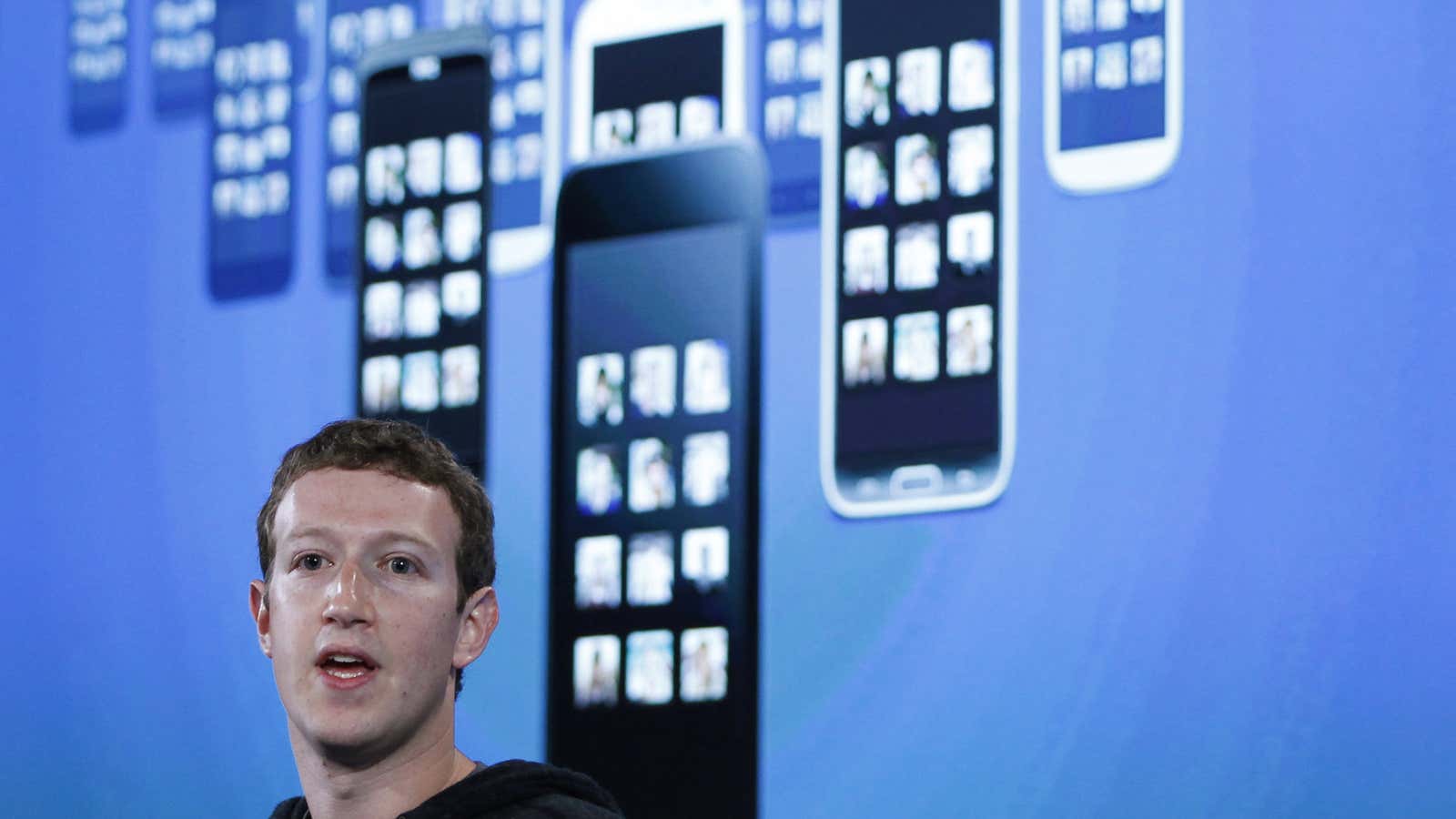Facebook is falling apart. On purpose.
Last year, Facebook tried—and failed—to get Android users to use Facebook as the primary interface for their phones with the Facebook Home app. Now, instead of going big Facebook is thinking small.
At the end of January, the company released “Paper,” an app that improves the appearance of your newsfeed. More recently, the company said it will create a separate app for its popular messaging function, which is used by some 200 million people every month. And while not many people use them, Facebook also offers a camera app and a “Poke” app. The company just bought a company called Moves (paywall), which makes a fitness tracker app.
Facebook isn’t alone in breaking itself up. LinkedIn offers five separate apps: One for your contacts; one for news (a counterpart to Facebook’s Paper); one specifically for recruiters; an app for Slideshare, a presentation sharing tool recently acquired by the firm; and the main, all-inclusive LinkedIn app. Google has always offered up a bevy of apps, and the recent departure of the boss of Google+ leads some to believe that it will split the failed social network into separate apps.
Capturing the prevailing mood, Facebook boss Mark Zuckerberg explained his thinking in a recent interview with the New York Times (paywall):
So Facebook is not one thing. On desktop where we grew up, the mode that made the most sense was to have a website, and to have different ways of sharing built as features within a website. So when we ported to mobile, that’s where we started—this one big blue app that approximated the desktop presence.
But I think on mobile, people want different things. Ease of access is so important. So is having the ability to control which things you get notifications for. And the real estate is so small. In mobile there’s a big premium on creating single-purpose first-class experiences.
Less is more
“Single-purpose first-class experiences” is a buzzword-heavy way to say that Facebook, and others like it, are simply moving with the times. People use desktop computers for hours at a stretch, often in one location. The mobile nature of laptop computers alters this behavior somewhat, allowing users to work in shorter bursts, as they tote the computer from place to place.
Smartphones make it even easier to dip in and out. People use them for mere minutes, sometimes seconds, at a time. But they do so dozens of times a day. According to Flurry, a research firm that tracks mobile app usage, “regular users” check their smartphones up to 15 times a day. These people account for just over half of Flurry’s sample. Just under a third are “super users” who check their smartphones between 16 and 60 times a day. And one in ten people, whom Flurry calls “addicts,” check their phones more than 60 times every day.
On the go, users like apps that quickly serve up what they’re after, whether it is messages, news, or the number of steps they walked that day. A multifaceted app adds unwanted steps to the process. And bloated offerings can be distracting.
“Any time a product or company chooses to just take their desktop use case and shrink it down to a two-and-a-half or three-inch screen, it’s not a long term viable strategy,” Deep Nishar, LinkedIn’s boss of product and user experience, told Quartz. “They want to get in, finish their task, and then move on to the next thing.”
2 + 2 = 5
In a sense, mobile is now doing to internet companies what the web has already done to countless other industries. The harsh demands of attracting and sustaining users’ attention means that the age of the bundle is nearing its end. This is true of written and video content, where single-serving articles and videos found on social networks are destroying the packaged business models of newspapers, magazines, and the video-rental industry. It is also true of advertising, with wide-ranging classifieds replaced by a bevy of specifically targeted websites and communities.
The firms that were born on the web have been faster to react than their predecessors. They are disrupting themselves before anybody else gets a chance. The bevy of apps promised by Facebook will include some that don’t even bear the Facebook brand (paywall). Nishar says LinkedIn has been operating a “multi-app strategy” for a few years already, and it will release more this year. Dropbox, until recently a single-purpose app that helped you stash files online, is also getting in on the action with a suite of apps.
The result will be a very different mobile user experience, in which the big companies try to dominate users’ attention—and measure, track, and monetize their behavior—not by owning the underlying platform like Google and Apple, but by becoming ubiquitous fixtures on their phones. The good news is that users will be able to pick and choose which services they like and which they can live without, with increasingly specific distinctions. The bad news is that the biggest incumbents can use their clout to shut out competitors—what looks like a loose federation of apps may be tied together by a single sign-on or other measures that, while convenient, also make it harder for others to win screen space. And speaking of screen space, expect yours to get a lot more cluttered as once-unified services break themselves up into a bunch of smaller pieces.
